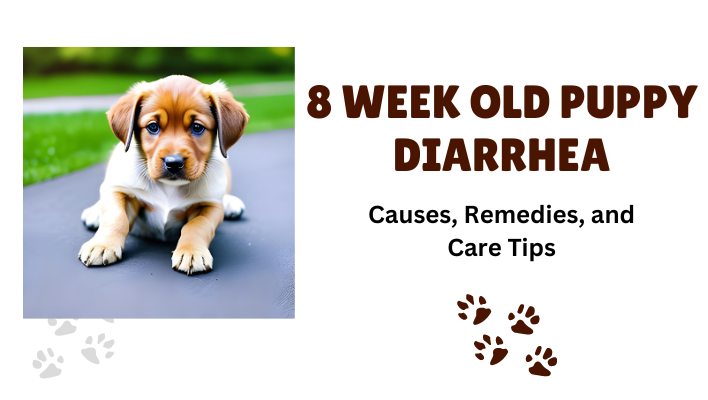Bringing home a new puppy is an exciting and fulfilling experience. However, it’s important to be prepared for the challenges that may arise, including health issues such as diarrhea. Diarrhea in an 8-week-old puppy can be concerning, but with the right knowledge and care, you can help your furry friend recover quickly. In this comprehensive guide, we will explore the common causes of diarrhea in young puppies, provide effective remedies, and share essential care tips to ensure your puppy’s well-being.
Table of Contents
Causes of Diarrhea in 8 week old puppy
To effectively address diarrhea in your 8-week-old puppy, it’s essential to understand the potential causes. Several factors can contribute to this condition, including dietary disruptions, parasites, stress and anxiety, infections, and food allergies or sensitivities. By identifying the underlying cause, you can take targeted steps to alleviate your puppy’s discomfort and promote a speedy recovery.
Dietary Disruptions
A sudden change in diet or introduction of new food items can upset a puppy’s delicate digestive system, leading to diarrhea. Gradual dietary transitions are crucial to avoid digestive disturbances. Additionally, ensuring a balanced and nutritious diet tailored to your puppy’s specific needs is vital for their overall health and well-being.
Parasites and Infections
Parasites such as roundworms, hookworms, and giardia can cause diarrhea in puppies. It’s important to schedule a veterinary appointment to have your puppy’s stool tested for parasites. If confirmed, your veterinarian will prescribe the appropriate medications to eliminate the parasites and help restore your puppy’s digestive health.
Stress and Anxiety
Stressful situations, such as moving to a new home or experiencing separation anxiety, can contribute to diarrhea in puppies. Creating a calm and secure environment for your puppy, gradually introducing them to new experiences, and providing ample love and reassurance can help alleviate stress and promote a healthier digestive system.
Food Allergies and Sensitivities
Just like humans, puppies can develop allergies or sensitivities to certain ingredients in their food. Identifying and eliminating potential allergens from your puppy’s diet can play a significant role in managing and preventing diarrhea. Working with your veterinarian to conduct an elimination diet or recommending hypoallergenic food options can help determine the specific triggers and ensure your puppy receives a suitable diet.
Remedies and Care Tips for Diarrhea in 8-week old puppy
When your puppy experiences diarrhea, there are several remedies and care tips you can follow to aid their recovery. These include:
- Maintaining hydration: Ensure your puppy has access to clean drinking water and, if necessary, offer an electrolyte solution specifically formulated for puppies to replenish lost fluids.
- Feeding a bland diet: Transitioning your puppy to a bland diet, such as boiled chicken and rice, can help soothe their digestive system. Consult your veterinarian for specific instructions.
- Probiotics: Probiotic supplements can promote healthy gut flora and aid in resolving diarrhea. Your veterinarian can recommend suitable options for your puppy.
- Monitoring stool consistency: Keep a close eye on your puppy’s stool consistency and report any abnormalities to your veterinarian. This information can assist in diagnosing underlying issues.
Read this also –Learn How to Train a Puppy at home step by step process
Conclusion
Diarrhea in an 8-week-old puppy can be distressing, but with the right approach, it can be managed effectively. By understanding the causes, implementing appropriate remedies, and following essential care tips, you can help your puppy recover swiftly. Remember, always consult your veterinarian for guidance and ensure your puppy’s well-being throughout the recovery process.
Can I treat my puppy’s diarrhea at home?
In some cases, you can manage mild diarrhea at home by feeding a bland diet, ensuring hydration, and using probiotics. However, it’s important to consult a veterinarian for proper guidance and to rule out any underlying health issues.
When should I seek veterinary care for my puppy’s diarrhea?
It is recommended to consult a veterinarian if diarrhea persists for more than 24-48 hours, is accompanied by other concerning symptoms, or if your puppy appears lethargic or dehydrated.
How can I prevent diarrhea in my 8-week-old puppy?
Preventing diarrhea involves gradually transitioning your puppy’s diet, providing a balanced and nutritious diet, keeping their environment clean and free from harmful substances, and ensuring they receive regular veterinary check-ups and vaccinations.

